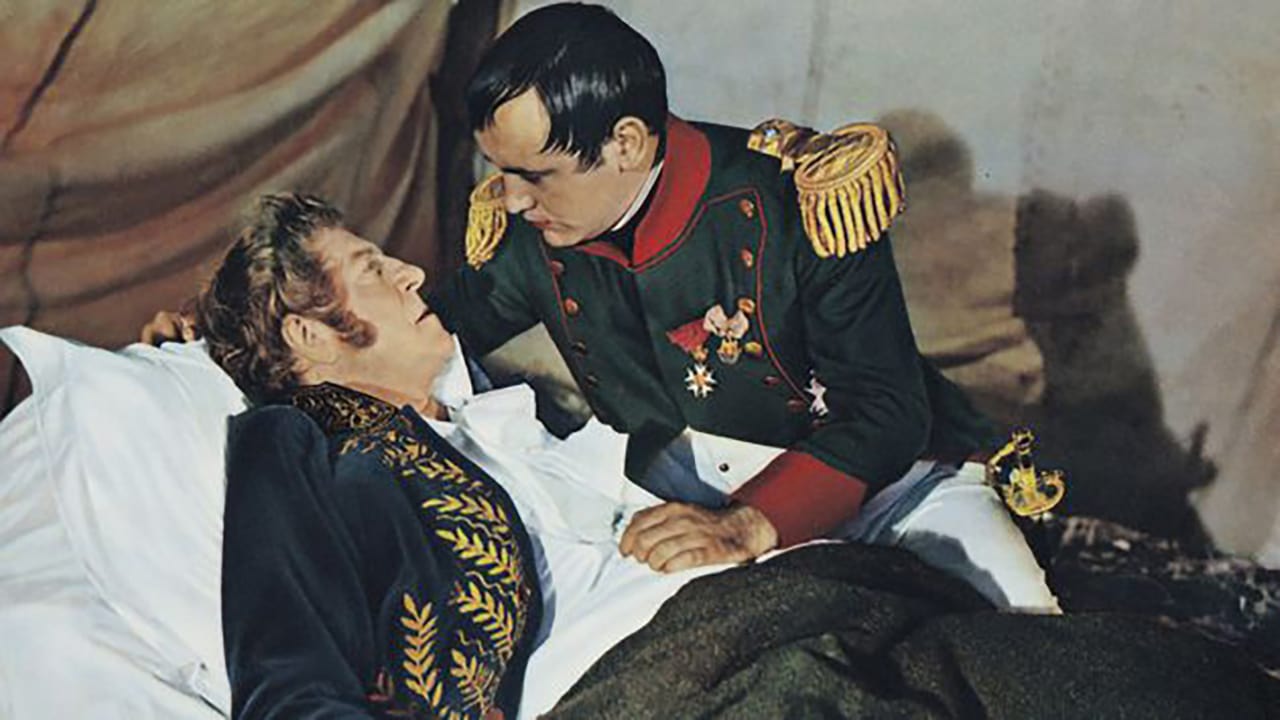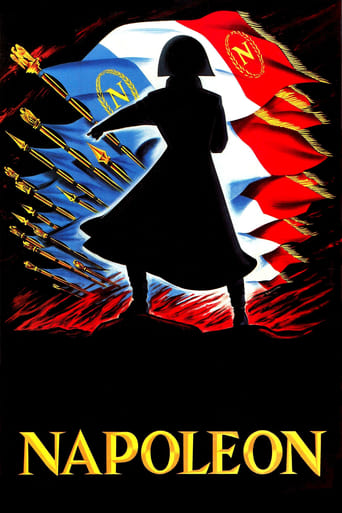



Let's be realistic.
Good story, Not enough for a whole film
A Masterpiece!
Go in cold, and you're likely to emerge with your blood boiling. This has to be seen to be believed.
View Morei'm sorry but for such a big fan of hist(e)orical accuracy i think, and it is just a honest opinion that you should have made a spell check on your post. Then you would have acknowledged the fact that the word "emporor" written with a capital E does not restore the Emperor's honor not even when compared to Sacha Guitry's terrible attempt...But your little spelling error tells us more about the "type of cat" you are more then it tells us about Guitry's failure to satisfy your taste in historical re- enactments. I'ts not like you had to direct a whole movie...you just made a small comment on it...and look how it turned out...well good chance in finding something better then Abel Gance's silly re-enactment...as if artistic films should do just that...re-enact things as close as possible to your own petty little view...and i see that you are not only an expert in historical movies and how they should be done, but that you are also an expert in type casting, movie business and what not...it's good to see that people like you are still around, so the whole thing doesn't crumble to pieces... keep up the good work of being you, and long live the Emporor...right right?
View MoreIt appears that most of the comments here are based on viewing of the ridiculous Showtime American edition, which cuts out, if I am not mistaken, more than half the film, is dubbed and, apparently substitutes narration for dialogue, of which there is plenty, as well as the narration, ostensibly Talleyrand relating Napoleon's story on the day of his death, framing the historical episodes. At a little over three hours, this is a spectacular epic, and I recommend heartily seeing the French edition (an excellent print in gorgeous color, if a little dirty by American re-mastering standards). It looks gorgeous -- much more interestingly shot, designed and lighted than Guitry's other color epics, "Si Versailles m'etait conte" and "Si Paris nous etait conte," both of which have a very disappointing, glaring flat look. Many interesting star turns, notably a weird Beethoven by Erich von Stroheim and Orson Welles as Napoleon's jailer on St. Helena, but also some excellent more sustained performances, particularly Michele Morgan as Josephine and Daniel Gelin as the young Napoleon. (As in his earlier "Le destin fabuleux de Desiree Clary", Guitry -- who insists that after Austerlitz Bonaparte became Napoleon, another man entirely -- casts the younger and older Napoleon with two radically different-looking actors.) It's a very enjoyable film, and, if you know French, well worth seeking out in the French edition (no subtitles, unfortunately). The American one is a complete waste of time and money.
View MoreExcept that this film is short, I was tempted to call it "NAPOLEON BLOWN-APART", but that suggests the film is actually long and has some degree of detail. THis monstrosity is under ninety minutes. There are short films about Napoleon, but they concentrate on one aspect of the man. CONQUEST deals with Napoleon and his Polish mistress. DESIREE with his relationship with Desiree Clary Bernadotte, the future Queen of Sweden. This was Sacha Guitry's attempt to do a complete account of Napoleon's thirty year career as a world figure, in a totally inadequate amount of time.The French version of the film actually has some continuity lacking in the English version. But most people in the U.S. have seen (if they have seen it at all) the English version. It is best known because of the cameo appearances, in particular of Orson Welles as General Hudson Lowe (who? - he's the British official who was appointed to be the jailer of Napoleon on St. Helena, but who managed to botch his assignment) and Eric Von Stroheim (very briefly) as Beethoven. Guitry, a talented boulevardier type, essayed the role of Talleyrand. None are shown to great advantage.It is set (apparently) in 1821, with Guitry in his Paris salon, talking to his intellectual friends, upon hearing the death of his former master. To be truthful, knowing Talleyrand, he would have said a word or two about Napoleon but then turned to more interesting current matters. The film does not go into the collapse of the relationship between the great Emperor and his gifted Foreign Secretary. Talleyrand was noted for his selfish ability to destroy a government that was no longer benefiting him, and then reappear in a more powerful position in the next regime. He helped destroy about seven of them, including Napoleon's. Historians have despised his selfishness, but they have usually praised him for knowing when to ditch the Emperor (Talleyrand was wary of the constant warfare, which the Emperor did not seem to know when to stop - he seemed to be using war to cover previous failures of policy, and to build up his remarkable reputation). The final blow was when Napoleon discovered that Talleyrand had been contacting Metternich and other foreign adversaries about undercutting Napoleon's diplomatic forays. In front of the whole court Napoleon cursed out Talleyrand, calling him a silk stocking full of "merde". He then left the court with his chief courtiers. Talleyrand watched thoughtfully, and said, "How sad that such a great man is so vulgar!" He redoubled his activities, assisted by his rival and foe (usually, but not here) Joseph Fouche, the head of the secret police. In 1814-15 they beat Napoleon at last.None of this is in the movie (at least the English version) that we see. Talleyrand is very philosophical, telling the story of the rise, fall, and rise of Napoleon and his legend. But in cramming the events from 1785 to 1821 we get a too rapid outline. The film though does even more than this. Talleyrand tells of how Napoleon's remains are returned to France for burial in Les Invalides (his magnificent tomb in Paris). But this happened in 1840, ordered by King Louis Philippe for popularity reasons. Only problem is that Talleyrand was dead by 1838.Since Welles is in the film for about two minutes, I might as well discuss this. In 1955 he was filming CONFIDENTAL REPORT (a.k.a. MR. ARKADIN), and (like OTHELLO) he was partly paying for it himself. So Welles was willing to appear in many films (especially in France) in bit cameo roles. His part is that of Lowe, who was a mediocre military figure who got the job as a last choice (the first choice, the Duke of Wellington, felt he and Bonaparte could never share an island together). Lowe was introduced to Bonaparte in the latter's residence of Longwood, and Bonaparte was polite like a host. But Lowe just glowered at him (as Welles does here). Bonaparte, quickly judging the idiot that he was stuck with, put his own hat on to show his contempt. It never improved, but we only see this scene.After Bonaparte died, his aides wanted a suitable tomb for him, but every time they presented a statement for the tombstone (General of the Armies, Emperor of France), Lowe turned down the recommendation. In disgust, they suggested a blank tombstone. Stupidly, Lowe agreed (as a surprised Welles does). Lowe never realized how truly eloquent the empty tombstone was - loyal Bonapartists from around the globe would know at that tombstone that no words could describe the giant who was under it adequately. Napoleon really did not need Les Invalides, but the French wanted to do it properly.The film is a total waste as a decent historical chronicle. Catch the 1927 Abel Gance classic, or CONQUEST or even DESIREE (even though it is a wretched film in it's own right - at least it gives the viewer some idea of how Sweden's modern royal family came into power). Catch the Armand Assante two part television movie about Napoleon and Josephine. But, unless you want to see all of Orson Welles or Eric Von Stroheim's performances, ignore this one. For Orson and Eric I give this a three.
View MoreFor the ultimate "Napoleon" experience we have to go to 1927 and Abel Gance's masterpiece. Guitry's version is solid - but it crams almost thirty years into one movie. Gance had a longer movie - but it ended in 1797; Waterloo was in 1815, and Guitry's account even went beyond Napoleon's death: it concluded with the glorious return of Napoleon's remains to Paris much later. Nonetheless, even though it moved from scene to scene too quickly and needed more character development, this is a solid historical account worth seeing. BEST OF ALL, both the Gance and Guitry versions give us an alternative interpretation of Napoleon instead of the usual Anglophile hate-filled anti-French propaganda, as seen in "Horation Hornblower" and others.
View More